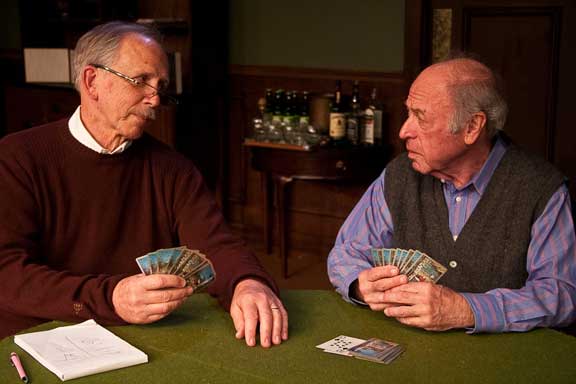A Well-Acted, Well-Directed, Interesting Character Study!

Alan Freeman and Steve Franken
PLAYWRIGHT: ALLAN MANINGS
‘GOODBYE, LOUIE . . . HELLO!’
THEATRE WEST, LOS ANGELES
SEEN APRIL 30, 2011
By Carol Jean Delmar
Opera Theater Ink
For John Gallogly, directing Allan Manings’ “Goodbye, Louie . . . Hello” at Theatre West was more than a directing gig. The process has been a labor of love.
Gallogly and Manings were friends for more than 30 years. Manings — who created “One Day at a Time” with his wife, actress Whitney Blake — died in May 2010 after a lengthy battle with cancer and a sudden heart attack. He didn’t live to see his play staged. It has been produced lovingly by Gallogly and Manings’ former manager, Jerry Goldstein.
In Exile
Manings moved to Canada when some of his friends were blacklisted during the McCarthy era. He returned to the United States in the early ‘60s, but his memories were impossible for him to shed.
“Goodbye, Louie . . . Hello!” begins as a type of comic sitcom between two retired Jewish actor-comedians who play daily gin rummy games. For some reason the image is not unlike the duo in Neil Simon’s “The Odd Couple.” Having been Danny Simon’s neighbor for many years (Danny was Neil Simon’s brother and a character in “The Odd Couple.”), I couldn’t help but see a resemblance between Danny and Steve Franken, the actor who portrays Benjamin “Benjy” Gordon in “Goodbye, Louie.”
The play sprouts from its Simon-esque mode and blossoms into a full-fledged character study well before intermission. Interestingly, Manings was able to capture the mental anguish of two men on both sides of the aisle: one who had been blacklisted (Benjy); and the other, his best friend Louie Berns, who had identified him to the House Un-American Activities Committee (HUAC).
When David Watson, a young journalist who interviews Berns, discovers his history, Watson confronts the comic. Berns abruptly terminates the interview. But his son Scott, who is Watson’s friend, delves into the issue until the truth is revealed. Louie admits the past to his son, daughter and to his best friend. And it all happens just prior to his move from New York to Arizona.
The play is a touching portrait of two men who cannot escape the memories of their past and must suddenly re-evaluate themselves and their relationship with each other after new hidden truths have been uncovered. The play also shows how family bonds become stronger in light of the new findings and in spite of them. It is a story of unconditional love within the family unit contrasted with the conditional love among friends.
The actors’ portraits are so convincing that I heard someone sniffling in the audience behind me.
There is a vast difference between modern stage acting, classical theater acting, and film and television acting. The latter is the most understated. Theater acting, and especially classical theater acting, is broader.
What is so unique about this production is that the actors are utterly natural in body and spirit. It is as if we are simply eavesdropping. The show could have been made for television, because we in the theater find ourselves observing actors who are projecting without theatrics, and what they are doing works in this intimate theater, too.
The most effective actor in the ensemble is Steve Franken (Benjy). His performance is so understated that he doesn’t appear to be acting. He is simply “being.” And he touches us.
Alan Freeman as Louie is a more dynamic, intense character. The two contrasting personalities bring colorful portrayals to the stage and complement each other.
Paul Denniston (Scott) realistically plays a son who has a complicated relationship with his father. He thinks he knows his father but discovers differently. He is seeking independence and an ability to exert his own free will, and this quest motivates him to test his father’s limits and to confront his father with his own opinionated views regarding morality .
Denniston has an ease of movement and an ease in calling forth his emotions. Maria Kress, who plays his sister Aimee, adds a more sympathetic character to the mix – one who adds balance and stability to the extremes.
The set – Berns’ New York apartment – has been tastefully drawn in browns which appear appropriately weathered and dated. Charlie Mount’s sound interventions add sparks to the action and during the scene changes.
Director John Gallogly, also the executive director of Theatre West, has done a superb job of creating an “as if it were really happening” onstage reality.
No doubt the historical events which awaken memories from the older set in the audience have little meaning to the younger generation. With all that is happening in the world today, the subject matter seems somehow dated. But is it really?
The play is, without a doubt, a memorial tribute to Allan Manings which will give him and this time in history another branch of immortality. It makes us remember a documented part of the history of film and television in Hollywood, and the history of our country. And much like Arthur Miller’s “The Crucible,” it enables us to recall a type of witch hunt that occurred, and to reflect upon the meaning of freedom.
Director: John Gallogly
Producers: Jerry Goldstein, John Gallogly
Set Design: Jeff G. Rack
Lighting Design: Yancey Dunham
Sound Design: Charlie Mount
Costume Design: Joyce B. Ferrer
Stage Manager: Roger Cruz